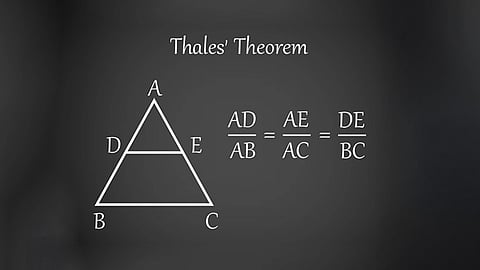From Thales to AI: Why existing knowledge still matters in scientific discovery
Key topics:
Importance of existing scientific knowledge and methodologies
Evolution from ancient to modern scientific thinking
Risks of rushing innovation, especially with AI and space tech
Sign up for your early morning brew of the BizNews Insider to keep you up to speed with the content that matters. The newsletter will land in your inbox at 5:30am weekdays. Register here.
Support South Africa’s bastion of independent journalism, offering balanced insights on investments, business, and the political economy, by joining BizNews Premium. Register here.
If you prefer WhatsApp for updates, sign up to the BizNews channel here.
By Toni Botes
Historians will tell you that scientific discoveries were preceded by our ability to think abstractly. Prehistoric humanity observed the physical world and formed theories relating to the sun, moon, stars, and more. Later, in 620 BCE Ionian pre- Socratic metaphysics and philosophy, Thales of Miletus began asking questions about the seemingly mystical powers of magnets. And then we tried to prove these theories in an effort to better understand the world around us. In order to prove them, however, we had to acknowledge empiricism – drawing conclusions from what was observed and rationalising the evidence.
Who Was Thales?
Thales was familiar with geometry and astronomy, which he is said to have picked up during his travels to Egypt. He looked for evidence and rational explanations rather than divine explanations. At the time, he was forming what were seen as rational concepts, though by today’s standards they were deeply flawed. As society progressed, we developed and refined our scientific methodology, and it cannot be denied this has served us well.
Break-It-To-Make-It
Wealthy, educated and curious, Thales and Elon Musk have changed the world. Thales stopped blaming storms on angry gods, and Elon will send us to Mars. This progression has left us rethinking scientific methodology. Elon’s famous six-step scientific method forms the basis of his research, but what he doesn’t mention is that he’s regularly been accused of rushing the scientific process to launch rockets and put chips into brains. The consequences can be dire; faster may not be better.
A summary of Elon Musk’s research process:
Ask a question
Gather evidence
Develop a principle based on the evidence and assign a probability of truth to it
Draw a convincing conclusion
Try to disprove this conclusion
Without invalidation of the conclusion, you have likely proven the hypothesis
Established Scientific Methodology
Scientific methodology largely remains rooted in empiricism and rationalism, amongst others. Empiricism is the use of experience and experimentation, while rationalism relies on reason and logic. It goes without saying that we would explore the science behind supermassive black holes using a completely different method from how we would develop biomaterials. No one is engineering a hadron collider to find bacteria that break down plastic. There are, however, crucial concepts that inform how we research these matters.
To date, our primary methods of research are:
Observational – examining natural phenomena without interference.
Descriptive – describing and documenting natural phenomena without testing the hypothesis.
Qualitative – collecting and analysing non-numerical data
Correlational – establishing the relationship between variables
Quantitative – gathering and scrutinising numerical data
Experimental – manipulating variables to test a hypothesis
Primary – research that advances scientific knowledge without concern for immediate practical applications
Applied – using existing scientific knowledge to solve practical problems
The above are just a few types of research that scientists often combine throughout the course of a study. It’s easy to see how our research methods can be interpreted as an existing body of knowledge. Contemporary scientists are reconsidering established methods of discovery because we have changed; these methods are losing their rigidity and are becoming subject to the field of study.
Enter AI
AI didn’t write this article, but it has become pivotal in processing massive amounts of information to speed up innovation. It may be the key to humanity’s progress, but what happens if we end up rushing into medical procedures and space exploration at the expense of human lives all over again? Perhaps our established scientific methodology cannot be thrown out the window just yet. After all, a study and the ensuing journal article still need to be recreated, peer-reviewed, and either proven or disproven.
Still, a deeper understanding of scientific topics will lead us further down the rabbit hole and potentially even help us prove or disprove other hypotheses and theories in far-flung fields. For now, it may be best to rely on our existing knowledge of scientific processes.
So, what questions are we asking today? And what does it take to solve these problems? We are exploring complex concepts ranging from supermassive black holes to communication between dolphins, and biomaterials. These vastly different fields are examples that can affect our understanding of the universe and advance astrophysics, without an immediate application or innovation that would affect our environment. Our enquiring minds will never rest because where there is a problem, question, or hypothesis, we will find answers, or die trying.

